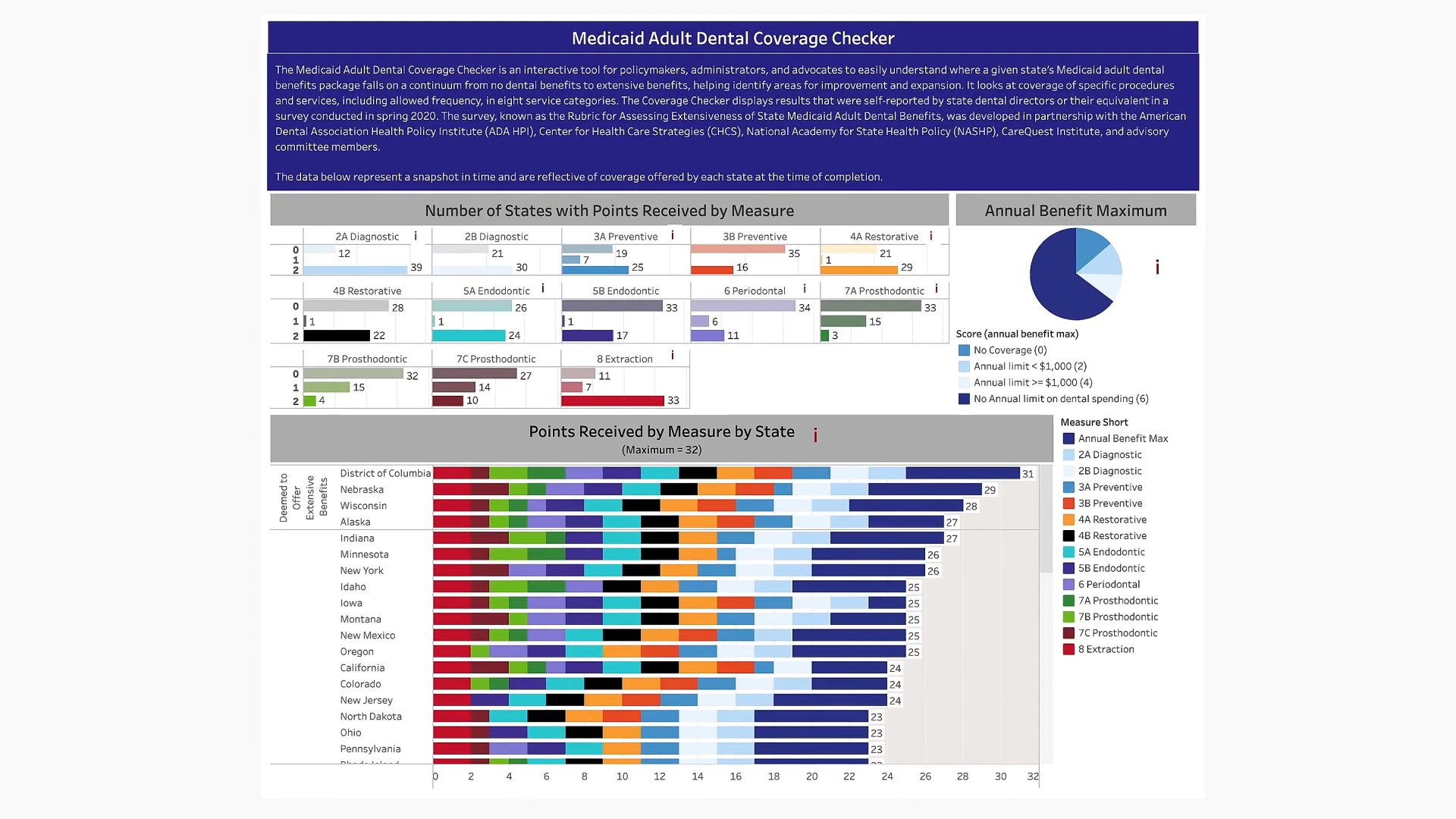BOSTON--(BUSINESS WIRE)--CareQuest Institute for Oral Health®, in partnership with the American Dental Association (ADA) Health Policy Institute, Center for Health Care Strategies, Inc., and the National Academy of State Health Policy (NASHP), announced the release of an innovative new resource to better assess and understand the extensiveness of Medicaid adult dental coverage in each state.
The Medicaid Adult Dental Coverage Checker is an interactive tool for policymakers, administrators, and advocates to easily understand where a given state’s Medicaid adult dental benefits package falls on a continuum from no dental benefits to extensive benefits, helping identify areas for improvement and expansion.
“Lack of dental insurance is a driving factor of wide health disparities that exist across underserved and marginalized communities,” said Myechia Minter-Jordan, MD, MBA, president and CEO of CareQuest Institute for Oral Health. “Recent research has shown that increasing dental coverage is one policy lever that can make a difference in more equitable access to dental care. Our hope is that this new tool raises awareness for administrators, policymakers, and advocates so they can design and strengthen dental benefits in Medicaid that meet the oral health needs of millions of adults across the country who do not currently have access to this critical care.”
Four leading oral health and health policy organizations built this new Coverage Checker to help stakeholders gain a deeper understanding of current benefits and clear guidance on ways to improve coverage. The organizations first created an updated evidence-based definition of an extensive Medicaid adult dental benefit and then developed a consensus-driven assessment survey, completed by state dental directors, to collect detailed information about adult dental benefits offered through the Medicaid program in each state.
“The Coverage Checker allows us to evaluate Medicaid programs based on very specific types of dental care services covered by the program as well as dollar annual limits. This is a huge step forward in understanding the policy landscape in oral health,” said Marko Vujicic, PhD, chief economist and vice president of the ADA Health Policy Institute.
The Coverage Checker looks at coverage of specific procedures and services, including allowed frequency, in eight service categories that are most commonly reimbursed by employer-based dental benefit plans and are critical to maintaining lifelong oral health.
“Oral health is critical to overall health and there are significant disparities for those who do not have access to dental services,” said Hemi Tewarson, NASHP’s president and executive director. “This tool gives a more complete picture of dental coverage across the country providing state leaders with data to help inform policy decisions and innovation.”
Medicaid is a key source of health care coverage for more than 80 million people in the United States. Although states are required to provide comprehensive dental benefits for children covered by Medicaid and the Children’s Health Insurance Program (CHIP), dental coverage for adult Medicaid beneficiaries is optional for states.
While most states provide at least emergency/urgent dental benefits (defined differently by states) for adults, nearly one-third of all states do not provide dental care beyond emergency procedures. According to new data from CareQuest Institute’s second annual State of Oral Health Equity in America survey, 77 million adults in the US do not have dental insurance.
Recent studies reveal the following benefits of comprehensive Medicaid coverage:
- Increased access to dental care can lead to lower medical care costs among individuals who are pregnant or who have chronic conditions such as diabetes and heart disease.
- Dental coverage significantly reduces costly emergency department (ED) visits for dental conditions. Dental-related ED visits nationwide cost an estimated $2.1 billion per year, but nearly 79% of those visits could’ve been addressed in a dental office, saving up to $1.7 billion per year.
- Children whose parents have Medicaid dental coverage are more likely to have had a dental visit in the past year and less likely to have deferred dental care.
- Adults who obtain dental coverage through Medicaid report improved oral health and employability.
Visit the CareQuest Institute website to access the new Coverage Checker.
About CareQuest Institute for Oral Health®
CareQuest Institute for Oral Health® is a national nonprofit championing a more equitable future where every person can reach their full potential through excellent health. We do this through our work in grantmaking, research, health improvement programs, policy and advocacy, and education as well as our leadership in dental benefits and innovation advancements. We collaborate with thought leaders, health care providers, patients, and local, state, and federal stakeholders, to accelerate oral health care transformation and create a system designed for everyone. To learn more, visit carequest.org and follow us on Twitter, LinkedIn, Facebook, and Instagram.



